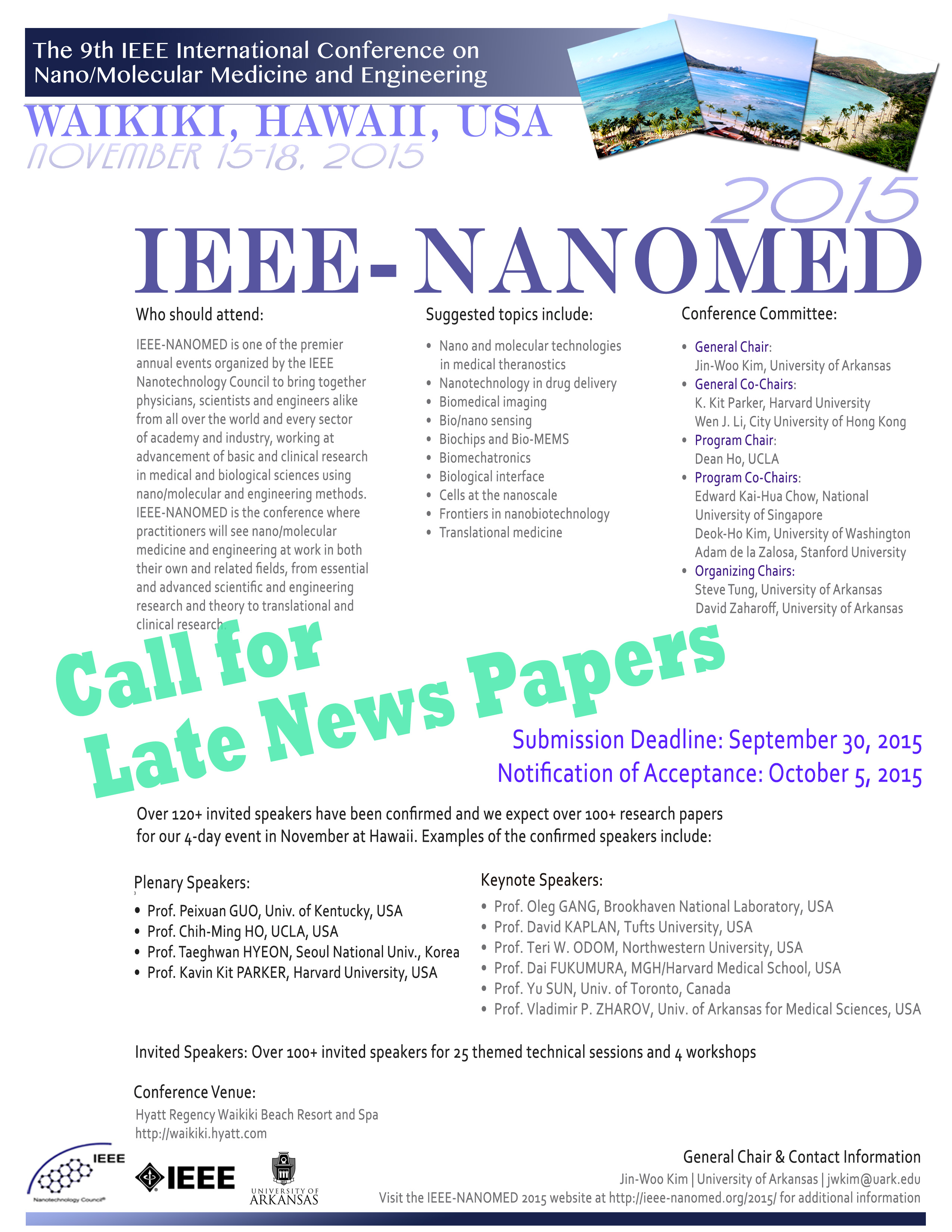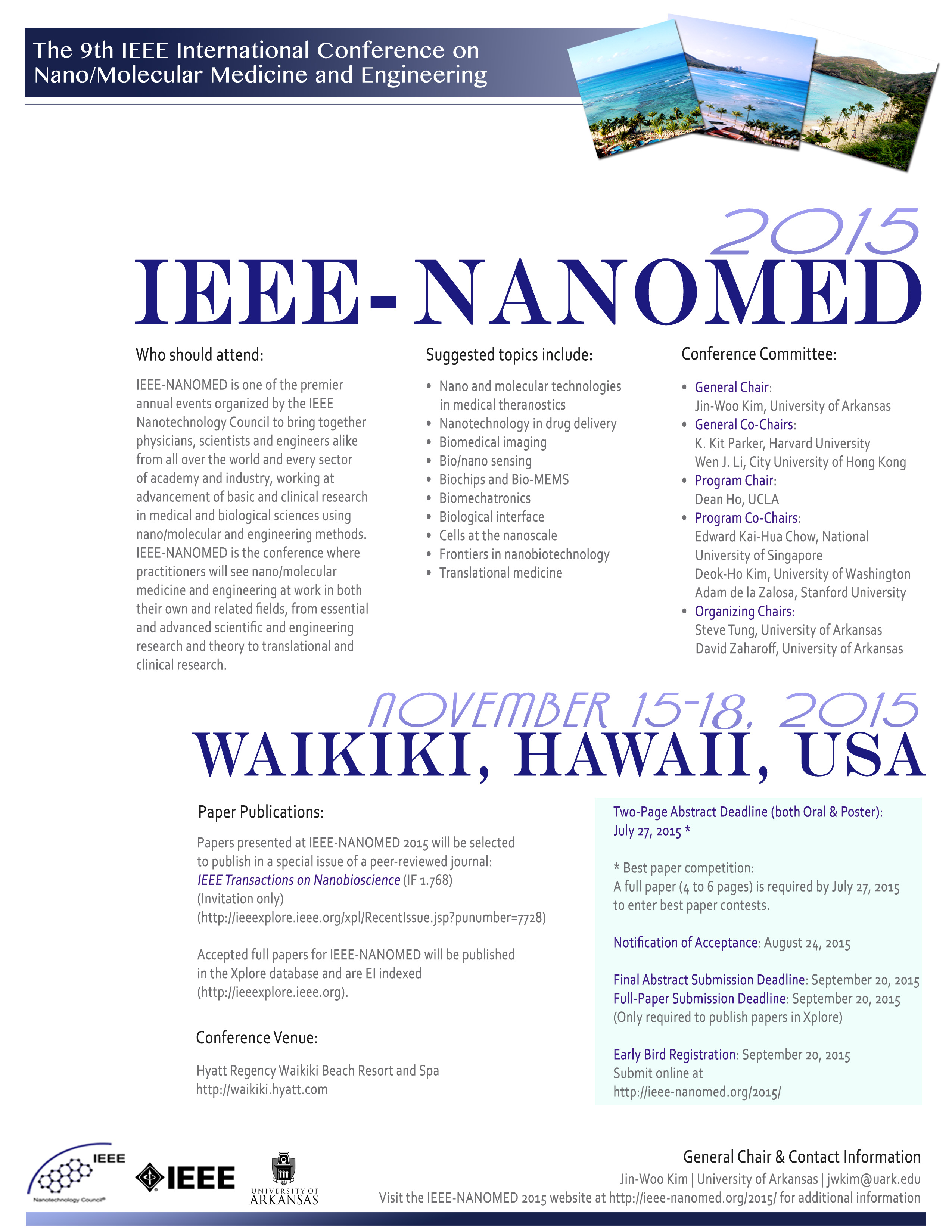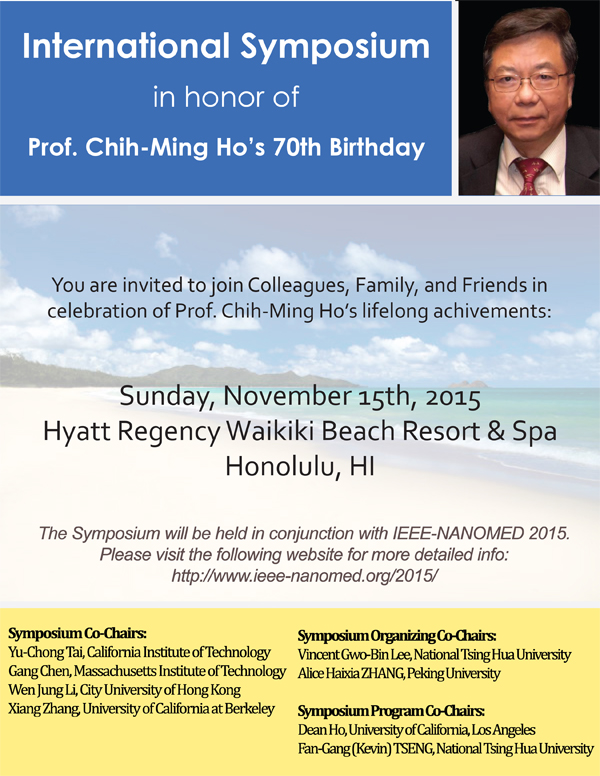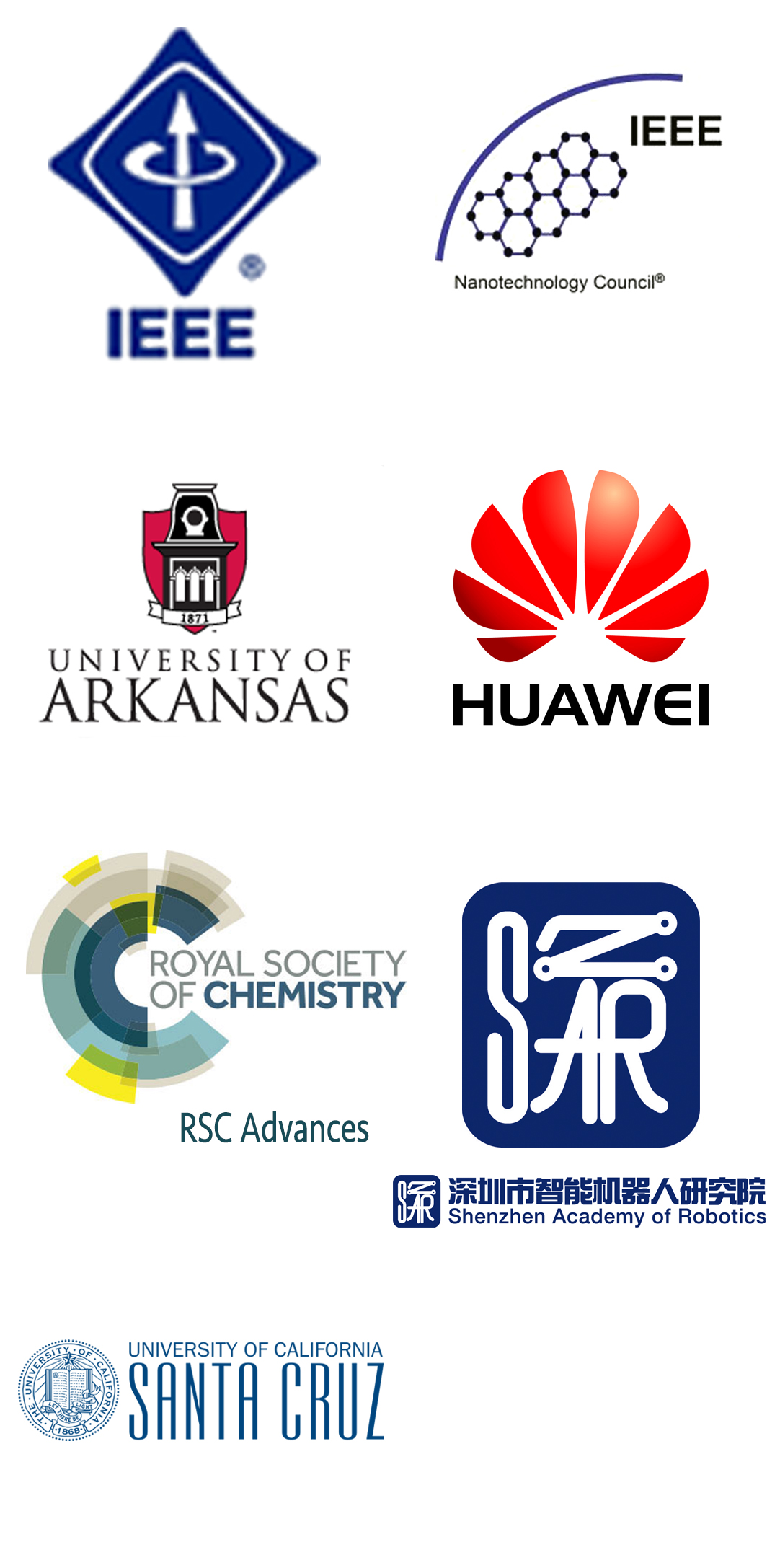[As of 7/10/2015]
-
TS-1: Bioelectronic Devices for Electroceutical Therapies and Diagnostics
-
TS-2: BioMEMS: Gene Circuits to Physiological Biomimicry
-
TS-3: Biochips and Bio-MEMS
-
TS-4: Computational Models of Cell Migration and Mechanics
-
TS-5: Detection, Delivery and Microscopy in Single Cells
-
TS-6: Emerging Nanocarriers for Improved Drug Delivery
-
TS-7: Innovative Optical Sensing Technologies for Biomedical Diagnosis
-
TS-8: Micro-Nano Engineered Platforms for Cellular Mechanobiology
-
TS-9: Microfluidics and Nanofluidics for Drug Carrier Development
-
TS-10: Microneedles for New Transdermal Drug Delivery Systems
-
TS-11: Nano/Microengineering-Assisted Therapy
-
TS-12: Nano/Microsystems for Clinical Diagnostics and Regeneration
-
TS-13: Nanobiomaterials and 3D Nano/microfabrication Techniques for Biomedical Application
-
TS-14: Nanobiosensors for Rapid and Sensitive Detection of Biomolecules
-
TS-15: Nanobiotechnology for Regenerative Medicine
-
TS-16: Nanotechnology in Drug Delivery
-
TS-17: Novel Approaches to Target Tumor Microenvironment
-
TS-18: Paper Microfluidic Devices for Molecular Diagnostics
-
TS-19: Quantitative Live Cell Imaging
-
TS-20: Stem Cells in Nanomedicine
-
TS-21: Theranostic Nanomaterials for Biomedical Applications
-
TS-22: Micro/Nano Technology for Surface Modification and Patterning
-
TS-23: Engineering-based Approaches to Personalized Medicine
-
TS-24: Biomolecular Nanomaterials for Advanced Devices
-
[Workshop] WS-1: Biomedical Optics for Clinical Nanomedicine
-
[Workshop] WS-2: Mechanotransduction at the Cell-Biomaterial Interface
-
[Workshop] WS-3: Single Cell Analysis Towards Personalized Medicine
-
[Workshop] WS-4: Soft Nano/Bio Devices for Biomedicine
Session Organizing Chair: Marco ROLANDI, Department of Materials Science & Engineering, University of Washington, Seattle, Washington, USA
Description: Progress in bioelectronics encompasses devices that mimic biological functionality and interface with biological systems. Silicon nanowires record and stimulate single cell potential. Gramicidin and bacteriorhodopsin are integrated with carbon nanotubes, silicon nanowires, and organic field effect transistors to develop biosensors with increased functionality. Ionic and mixed conductivity in biological and organic polymers record and stimulate physiological functions, and are assembled into logic circuits. Edible batteries power these circuits. This session will focus on recent developments in bioelectronic devices that are designed to sense and treat medical conditions towards electroceuticals, or medicines that affect physiological function with electronic and ionic signals.
Session Organizing Chair: YongTae KIM, George W. Woodruff School of Mechanical Engineering,
Georgia Institute of Technology, Atlanta, Georgia, USA
Description: This session includes 5 invited speakers’ talks on cutting edge approaches in multiscale biological systems engineering that involves the design and manipulation of microengineered electromechanical systems at molecular, cellular, and tissue levels for advanced biotechnology and nanomedicine.
Session Organizing Chair: Amy SHEN, Okinawa Institute of Science & Technology Graduate University, Okinawa, Japan
Description: This session provides a forum to discuss the current trends and technologies in Biochips and Bio-MEMs for nanomedicine applications.
Session Organizing chair: Taeyoon KIM, Purdue University, West Lafayette, Indiana, USA
Description: Mechanical forces have recently been recognized as one of the important regulators of structures and functions of cells. Cells need to respond to external mechanical stimuli and sense surrounding mechanical environments for their proper biological functions. During the response and mechanosensation, they exhibit very interesting, complex viscoelastic properties depending on time scales, attributed to mechanics and dynamics of intracellular components such as cytoskeleton. In addition, many kinds of cells are capable of migrating toward or away from diverse types of cues via distinct strategies, which is deeply involved with physiological and pathophysiological phenomena such as metastasis, wound healing, angiogenesis, and embryogenesis. Understanding the mechanics and migration of cells is very critical for elucidating intrinsic mechanisms of various biophysical processes. Computational models have significantly contributed to better understanding about those mechanical aspects of the cells since such models are able to dissect and study the contribution of each intracellular component at microscopic scale to cell mechanics and migration at macroscopic scale. In this session, we will bring together researchers investigating the cell mechanics and migration using various computational models.
Session Organizing Chairs: Tim YEH, Department of Biomedical Engineering, University of Texas, Austin, Texas, USA; Megan HO, Interdisciplinary Nanoscience Center (iNANO), Aarhus University, Aarhus, Denmark
Description: This session will focus on imaging tools and nanosensors that can probe cellular activities at the single-cell level. For imaging tools, super-resolution microscopic techniques that are compatible with live cells are of primary interest. One example is the high-resolution 3D single-particle tracking microscopy. For nanosensors, methods that address multiplexed detection and systems that can function both as “sensors” and “actuators” are the emphases. One example is the plasmonic nanosensors for tunable molecule release inside single cells. Specific applications of these imaging tools and nanosensors for cancer research, disease detection and treatment will be discussed.
Session Organizing Chair: Seungpyo HONG, Department of Biopharmaceutical Sciences, University of Illinois, Chicago, Illinois, USA
Description: This session seeks papers that describe emerging nanocarriers for improved drug/gene delivery. Those nanocarriers include a variety of hybrid systems, novel polymer-based systems, inorganic nanoparticles, and carbon-based platforms that have recently attracted a great deal of scientific interests. This session will emphasize those novel systems and their impact in targeted drug/gene delivery applications.
Session Organizing Chair: Donglei (Emma) FAN, University of Texas, Austin, Texas, USA
Description: The special invited session will focus on innovative optical sensing mechanisms, approaches, fabrication, and devices for sensitive, precision, dynamic, and rapid detection of analytes, relevant to biomedical diagnosis. The sensing principles include, plasmonics, fluorescence and their hybrids.
Session Organizing Chair: Yu SUN, Department of Mechanical & Industrial Engineering, Institute of Biomaterials & Biomedical Engineering, University of Toronto, Toronto, Canada
Description: This session offers several presentations to discuss micro/nanotechnologies-enabled devices and instruments for studying cellular mechanobiology. Cell function is directed by several factors in the microenvironment, including mechanical forces. Cells sense the mechanical characteristics of their microenvironment and translate the mechanical cues to intracellular biochemical signals that regulate several cellular and molecular processes important in development, homeostasis, and disease. Much of our understanding of the molecular mechanisms underlying the ability of cells to sense and react to mechanical stimuli is largely based on traditional macroscale tissue culture assays. Novel micro- and nanoscale techniques for investigating cellular mechanobiological processes in normal and pathophysiological contexts have been under intense development in recent years. These approaches are providing new insights into cell mechanotransduction and mechanobiological responses, leading to improved fundamental understanding of cell biology and new strategies for cell-based regenerative therapies. This session will discuss some of those recent advances in integrative cellular mechanobiology, including new discoveries and micro- and nanoengineered technologies.
Session Organizing Chair: Jungkyu (Jay) KIM, Department of Mechanical Engineering, Texas Tech University, Lubbock, Texas, USA
Description: This session seeks papers that describe studies involving micro/nanofluidic techniques for drug synthesis and drug carrier productions. This session broadly encompasses the on-chip synthesis, processing and characterization of drug carrier with traditional micro/nanofabrication techniques, multiphase flow and autonomous micro/nanofluidic platform.
Session Organizing Chair: Beomjoon KIM, The University of Tokyo, Institute of Industrial Science, Tokyo, Japan
Description: This session will exhibit and introduce the latest developments in micro needle based-technology and its applications, especially to new transdermal drug delivery systems. The gathering will provide a platform to facilitate interdisciplinary communications and new collaborations for delegates from academic, industrial, pharmaceutical, and clinical backgrounds. The fields will cover design and fabrication technologies for micro needles, drug and vaccine delivery as well as sensors and electrodes, immunology, skin biomechanics, regulatory issues, etc. Moreover, not only miniaturized needles but also novel MEMS devices and nano/bio molecules, which allow transport of macromolecular drugs will be discussed.
Session Organizing Chair: Yanan DU, Department of Biomedical Engineering, School of Medicine, Tsinghua University, Beijing, China
Description: This session will highlight the latest advances in taking advantage of nano/micro scale technologies as powerful tools to facilitate therapeutic applications for treatment of severe diseases. Novel nano/microengineered systems will be exemplified by nano-carriers for drugs and genes with targeted delivery and high efficiency or as micro-carriers for cells for high efficient regenerative therapy or as nano/micro devices to manipulate the cell/tissue fates for improved therapeutic performances. The selected speakers will represent diverse background with interdisciplinary expertise in related fields.
Session Organizing Chair: Justyn JAWORSKI, Department of Chemical Engineering, Hanyang University, Seoul, Korea
Description: This session will offer insight into new and emerging topics of interest to researchers and physicians focusing in medical devices based on micro/nanotechnology platforms. Because of the diversity of nanotechnology research that exists, in this session we will converge primarily on advances in micro/nanofabrication techniques. With this, the session will showcase engineering works on forthcoming medical tools for diagnostic as well as regenerative medicines. Topics of interest include micro/nanofabrication techniques for the development of analytical tools for biomarker and chemical analyte detection as well as micro/nanoscale patterning techniques for engineering cellular level environments for directing cell growth and behavior.
Session Organizing Chair: Lijie Grace ZHANG, Director of the Bioengineering Laboratory for Nanomedicine & Tissue Engineering, Department of Mechanical & Aerospace Engineering and Department of Medicine, George Washington University, Washington DC, USA
Description: Nanobiomaterials are biomaterials with nanometer features that can simulate the dimensions of natural tissues or organs. They offer a broad range of properties that can differ dramatically from their bulk counterparts and are attractive for biomedical applications. This symposium aims to bring together experts in medicine, engineering, and science to discuss developments in nanobiomaterials and 3D nano/microfabrication techniques for biomedical applications. It will focus on novel material advancements, advanced fabrication techniques for various biomedical applications including but not limited to tissue regeneration, drug delivery and cancer treatments, etc.
Session Organizing Chair: Sang-Hyun OH, University of Minnesota, Twin Cities, Minnesota, USA
Description: Advances in top-down nanofabrication and bottom-up assembly techniques have enabled a new generation of biosensors for rapid and sensitive detection of analyte molecules. While significant progress has been made in improving the detection sensitivity, many challenges still remain such as overcoming the diffusion limit in miniaturized sensors and interfacing engineered surfaces with biomolecules. This session will focus on how to harness engineered nanostructures – such as nanoparticles, nanopores, nanowires – to address the fundamental challenges in biosensing and spectroscopy.
Session Organizing Chair: Deok-Ho KIM, Department of Bioengineering, University of Washington, Seattle, Washington, USA
Description: This session will offer insight into new technologies of interest to researchers focusing on the development of more biomimetic models of human tissues for preclinical and clinical utility. The session will highlight novel micro and nanoengineering techniques for promoting cell and tissue development, and discuss the importance of these methods in driving forward our ability to generate accurate human tissues for regenerative medicine applications. Topics of interest include micro/nanoscale patterning techniques for enhancing cell growth, maturation, and behavior, and multiscale modeling of human organs to improve our understanding of the role of the in vitro microenvironment in regulating engineered tissue development.
Session Organizing Chair: Dong Woo LIM, Hanyang University, Seoul, Korea
Description: Controlled bionano architectures have been of great interest for advanced drug delivery. This session focuses on development of a new class of functional bionano materials for DNA vaccination, controlled drug release, tissue engineering, regenerative medicine, and bioimaging.
Session Organizing Chair: Mahavir B. CHOUGULE, Department of Pharmaceutical Sciences, The Daniel K. Inouye College of Pharmacy, University of Hawaii, Hilo, Hawaii, USA
Session Organizing Chair: Hideaki TSUTSUI, University of California, Riverside, California, USA
Description: Paper microfluidic devices are quickly emerging as a new platform technology to provide economical solutions to medical diagnosis, environmental monitoring, and food and water safety at places where conventional technologies are difficult to come by. This session will focus on recent advancements in fabrication methods, analyte detection mechanisms, system integrations, and new applications. The goal of this session is to exchange exciting new ideas and foster innovations of paper microfluidic technologies.
Session Organizing Chair: Kwonmoo LEE, Worcester Polytechnic Institute, Worcester, Massachusetts, USA
Description: There has been a lot of advances in fluorescence microscopy which allowed unprecedented progress in molecular and cellular biology. However, extracting quantitative information from live cell images are still great challenge in biomedical investigation. This session will focus on new development of imaging technologies shedding light on quantitative nature of biological processes.
Session Organizing Chair: Morayma REYES, Montefiore Medical Center & Albert Einstein College of Medicine, Bronx, New York, USA
Description: Many recent advances in the stem cell technology have been achieved with the integration of tissue engineering at the nanoscale level to instruct stem cells to function as desired for a given application. Some of these applications involved enhancing differentiation or stemness, engraftment, targeted delivery, proliferation and survival. This session broadly encompasses new advances in stem cell nanomedicine. Basic science, translational and clinical works are welcome.
Session Organizing Chair: Min-Ho KIM, Biological Sciences, Kent State University, Kent, Ohio, USA
Description: Theranostic nanomedicine is an emerging area of reseach, involving the use of nanoparticles or other nanomaterials for diagnostics, imaging, and therapeutic applications. Recently, there have been increasing efforts to develop various theranostic nanoplatforms for nanomedicine applications and interests in theranostic nanomaterials continue to rise. This session will focus on the current state-of-art research on the use of emerging theranostic nanomaterials for biomedical applications including biosensing, cancer therapy, and wound healing.
Session Organizing Chair: Hongsoo CHOI, Department of Robotics Engineering, DGIST-ETH Microrobot Research Center, Daegu Gyeongbuk Institute of Science & Technology (DGIST), Daegu, Korea
Description: Micro/nano technology have attracted researchers in many different fields with emerging applications. Micro/nanofabrication technology, which has significantly advanced in recent years, is the foundation of the topological engineering. The potential applications of topological engineering based on micro/nano technology include self-assembly, label free bio detection, biomimetic artificial cochlea, biomimetic extracellular matrix (ECM) for neural interface, etc. In this Special Session, we aim to bring together researchers with diverse backgrounds and hold open discussions on innovative fabrication technologies and various applications of micro/nano technology for topological engineering and biomedical engineering. The Special Session is devoted to rewarding academic communities with knowledge about cutting edge research results and new challenges.
Session Organizing Chair: Pak Kin WONG, Department of Aerospace & Mechanical Engineering, University of Arizona, Tucson, Arizona, USA
Description: Recently, personalized or precision medicine has become a major goal of most biomedical research. The need for personalized medicine is clear as patient heterogeneity is a major roadblock in the treatment of many complex diseases such as cancer. A wide range of approaches has been developed to deal with this problem and make personalized medicine a reality. In this session, we will explore how non-traditional approaches, such as engineering-based approaches, to drug optimization can be implemented towards personalized medical treatment.
Session Organizing Chair: Haewook HAN, Department of Electrical Engineering, Pohang University of Science & Technology (POSTECH), Pohang, Korea
Description: Biomolecular nanomaterials have recently recognized as new photonic materials over a wide range of electromagnetic spectra, including UV, visible, infrared, and terahertz waves. DNAs and proteins can be used to fabricate biomolecular nanocrystals doped by dye molecules to activate specific optical properties for device applications. This session will focus on the recent advances in the design, fabrication, and characterization of biomolecular nanomaterials for advanced devices.
Workshop Organizing Chairs: Euiheon CHUNG, Department of Medical System Engineering & School of Mechatronics, Gwangju Institute of Science & Technology (GIST), Gwangju, Korea; Chulhong KIM, Department of Creative IT Engineering, POSTECH, Pohang, Korea
Description: This session aims at bringing together seasoned and new researchers in the field of biophotonics to tackle challenging problems we face today and tomorrow: cancer and brain disease. These major issues require innovative imaging modalities and nanoprobes to detect molecular, cellular, and tissue-level changes with advanced fluorescence imaging, optical coherence tomography, ultrasound mediated optical tomography, super-resolution microscopy, phase-based imaging, and even computational microscopy. This session will provide a platform to foster sharing and collaboration in this vibrant research arena. Preclinical and clinical impacts of these pioneering imaging modalities in nanomedicine would be emphasized.
Workshop Organizing Chair: Kristopher A. KILIAN, Department of Materials Science & Engineering, University of Illinois, Urbana-Champaign
Description: Cells integrate soluble signals with the mechanical and biochemical properties of the extracellular matrix to guide diverse biological processes. Through careful design of the biomaterials interface, cell adhesion and mechanotransduction can be influenced to direct desired outcomes. In this session, world leaders in biomaterials science and mechanobiology will discuss emerging trends in engineered extracellular matrices, to better inform the design of biomaterials for regenerative therapies and tissue engineering.
Workshop Organizing Chair: S.J. Claire HUR, Rowland Institute at Harvard University
Description: Rapid advances in clinical medicine have revealed new formidable obstacles associated with individual variations in treatment responses. These diverse responses to therapy lead to the development of personalized medicine for better therapeutic outcomes, but systematic and quantitative single-cell level analyses are imperative to identify factors contributing to the heterogeneity. This session will focus on recent advancement in micro- and nanotechnologies, facilitating single-cell level cellular assays in order to elucidate underlying relationships between cellular phenotypes and disease states and to gain new insights into these clinical questions.
Workshop Organizing Chair: Jae-Woong JEONG, Department of Electrical, Computer & Energy Engineering, University of Colorado, Boulder, Colorado, USA.
Description: Conventional biomedical devices that interfaced with biological organs were rigid and bulky. Biological organs and systems, by contrast, are soft, elastic and curved. This session will address recent research and development initiatives for a new class of soft, flexible nano/bio devices that overcome this fundamental mismatch in mechanics and form.




